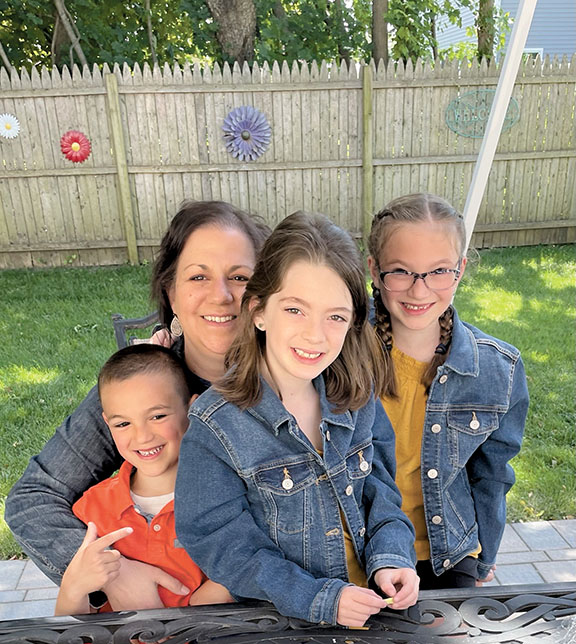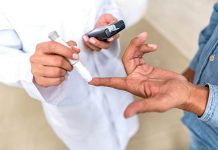
By Vita Duva
Middletown resident Allison DeAnda’s journey with cancer began in January 2018 when a mammogram detected an abnormal mass. Following a sonogram and breast biopsy, the irregular area still went unidentified by doctors, leaving DeAnda without an immediate or concrete answer.
Having previously had a myomectomy – a surgical procedure to remove uterine fibroids – at Memorial Sloan Kettering (MSK) Monmouth and not wanting to take chances, DeAnda was referred to Laurie J. Kirstein, M.D., FACS, a breast surgical oncologist with clinical expertise in breast cancer and high-risk breast cancer screening.
“Dr. Kirstein was amazing,” DeAnda said. “She was warm and compassionate, but also had a great bedside manner. She sits on the table right next to you and rubs your back, and brings you a tissue when you are crying.”
But it was not until November 2019, after what DeAnda refers to as another “regular” routine mammogram, followed again by a sonogram and breast biopsy, that a doctor would officially diagnose her with breast cancer.
“I just put in my head: ‘I’m a survivor. I’m going to beat this and I’m just going to take it one day at a time and do my best every day to try and keep a positive outlook,’ ” DeAnda said. “Granted, there are some days in there that aren’t that great, but I try not to let them outweigh the good.”
From there, DeAnda’s journey would move quickly and tax her with a long and winding road of ups and downs. Her treatment plan, put in place by Kirstein, consisted of chemotherapy first, DeAnda’s choice of a double mastectomy with no reconstruction, followed by radiation.
DeAnda is a proud mother of three – 8-year-old twin girls, and a 6-year-old son – and for her, figuring out how to broach the subject with her children was the hardest part.
“In the beginning, I was just in survival mode, saying to myself, ‘This is what I have to do, this is what I have to do,’ ” DeAnda said. “And even when I felt crummy, I was like, ‘I still have to get up and make them breakfast.’ I had to keep our routine the same as best I could.”
DeAnda was then referred to Sue Park, M.D., a medical oncologist with clinical expertise in breast cancer.
Following a PET scan, Park and her team found a mass on DeAnda’s kidney and another mass on her thyroid. Both ultimately turned out to be cancer. Following more surgeries, DeAnda had genetic testing and everything came back negative. But having been invited to join an impact study, initial bloodwork came back that she had a genetic mutation for Lynch syndrome. As a result of that outcome, DeAnda had a full hysterectomy as a preventive measure.
For now, DeAnda has finished her active treatment and is in remission. As of December 2021, DeAnda has been actively working through a two-year maintenance chemotherapy plan with Park, along with routine medication and regular in-office checkups.
“I know everybody’s journey is different. I personally found it emotionally harder after everything was over. You feel like a sitting duck,” DeAnda said. “It just hit me like a ton of bricks. I was like, ‘Oh my gosh, this is real life.’ I just tried to adapt this positive attitude as best I could, telling myself, ‘I’m beating this, I’m beating this, I’m going to beat this.’ I’m going to try and laugh my way through it, and make fun of myself.”
DeAnda, a speech-language pathologist in the New York City school system, stressed the importance of a positive outlook.
“Cancer is very scary, but I feel like your attitude just plays such a huge role.”
June was National Cancer Survivor Month which honors patients who have completed treatment and who are currently in treatment. The term “cancer survivor” can mean different things to different patients and refers to anyone who has been diagnosed with cancer.
“Allison and I bonded immediately,” said Kirstein, her breast cancer oncologist. “Perhaps it is because we are both mothers of multiples and shared mutual parenting experiences.”
Kirstein noted DeAndra’s positive outlook as well.
“As Allison moved through her journey over the past few years, I marveled at her strength and humility. She is a very real, down-to-earth person, with good values and priorities. She is a fighter, for herself and her children. I see these special, amazing qualities in her, and am privileged to be a part of her team,” Kirstein said.
According to Park, one misconception surrounding survivorship is people think you have to have survived a certain amount of years before being considered a survivor. Sometimes patients do not always feel well enough to be considered a survivor. Other times, patients feel the term survivor means they have already gone through it and it is in the past. But ultimately, survivorship leads to increased awareness about cancer, cancer screening, cancer treatments and cancer research.
“Survivorship means something different to each of my patients and I support their individual versions of what it means to them. It is not for me to define, as that would, in some way, limit the possibilities of what it could mean for someone,” said Kirstein. “I recognize that the word ‘survivorship’ may have some difficult associations for people, and I only wish that I could remove those negative feelings. What I have seen over the last 15-plus years is that each person moves through this process differently, and what is on the other side when treatment ends is what I see as survivorship.”
At MSK Monmouth, licensed clinical social workers also play an essential role in providing emotional support and assistance with coping and guidance, accessing community resources to patients, as well as friends, families and caregivers. Social workers further assist patients with practical and financial concerns, including how treatment can impact one’s job. Social workers are available to all patients and at any stage of their illness experience.
“I support people with many different types and stages of cancer, enabling me to see every aspect of the illness,” said Janine Genovese, a social worker at MSK Monmouth, about how her job lends her a unique perspective of survivorship. “My training and experience prepare me to support people through the most challenging time in their life. It is a rewarding and enriching experience to be part of their journey.”
MSK Monmouth offers a post-treatment resource program for survivors who have finished active treatment. There are different survivorship programs for each type of cancer. The criteria to be eligible for each program can vary from type to type.
“(Cancer) may affect not just how you look physically – especially for breast cancer survivors – but also impact you emotionally, mentally, socially and financially,” said Park. “Living beyond breast cancer can look very different from one person to the next. Moving on with life after the primary treatment is done is often the more challenging part. Many people want to feel normal again and return to their normal life as soon as possible.”
“People enter survivorship programs at a point when they are a few years out from their diagnosis, doing well, not really needing to be closely followed by their oncologist anymore, but still needing to be monitored by their oncology team,” Park explained.
MSK Monmouth’s Resources for Life After Cancer (RLAC) aims to create a community of support, education and hope through educational lectures, support groups, counseling services, advocacy and community referrals to help people live well after cancer treatment.
“To me, living beyond breast cancer means being able to have the experience of being diagnosed and going through breast cancer treatment becomes part of the fabric of someone’s life, without having it dominate their existence in a negative way,” said Kirstein. “It means seeing how this experience helped shape who a person has become, and potentially be able to use it to help others.”
“In my own journey, talking to other people who went through it really helped. People mean well and they try to say the right thing – and sometimes they don’t say the right thing – but I think they all mean well,” DeAnda said. “So, I am going to share my story because if my story can help others, then that is what I want it to do.”
The article originally appeared in the August 4 – 10, 2022 print edition of The Two River Times.














